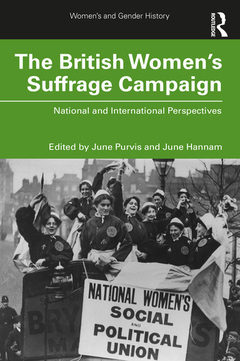Description
The British Women's Suffrage Campaign
National and International Perspectives
Women's and Gender History Series
Coordinators: Purvis June, Hannam June
Language: English
Subject for The British Women's Suffrage Campaign:
Keywords
suffragette; suffragist; Millicent Fawcett; Emmeline Pankhurst; Elizabeth Wolstenholme Elmy; Isabella Ford; Sophia Duleep Singh; Lady Isabel Margesson; servants; class; Great War; suffragism; militant suffragism; women's movement; British Women’s Suffrage Campaign; International contexts; Women’s Tax Resistance League; British women's suffrage campaign; NUWSS’s Executive Committee; Feminist historians; Election Fighting Fund; National contexts; WSPU Organiser; Democratic right; WSPU Member; Women’s Suffrage; WSPU Meet; Dora Montefiore; British Women’s Suffrage; WSPU Leader; Suffrage Campaign; Hampton Court Palace; British Women’s Suffrage Movement; Sweated Women Workers; Victoria Tower Gardens; Manchester National Society; International Woman Suffrage Alliance; Women’s Suffrage Campaign; Suffrage Movement; Women’s Suffrage Societies; Women’s Franchise; Adult Suffrage; Lady Stout; Women’s History Network Conference
Publication date: 12-2020
· 15.6x23.4 cm · Paperback
Publication date: 12-2020
· 15.6x23.4 cm · Hardback
Description
/li>Contents
/li>Readership
/li>Biography
/li>
This book brings together twelve chapters from feminist historians from around the world to offer new perspectives on aspects of the campaign for women?s suffrage in Britain.
Although the focus is on Britain, this volume signals how the women?s suffrage campaign in Britain embraced both national and global aspects. The historical developments and structures that affected women?s lives and suffrage struggles were not limited to national contexts. Early chapters focus on particular individuals both well and lesser known, including Millicent Garrett Fawcett and Emmeline Pankhurst, as well as Elizabeth Wolstenholme Elmy, Princess Sophia Duleep Singh, Lady Isabel Margesson and Isabella Ford. Later chapters highlight the interrelationship between the British movement and suffrage campaigns across the globe with reference to Austria, Japan, New Zealand, Australia and the USA. The chapters deal with issues around strategies, social class, employment, religion, nationalism, empire and race and explore complex issues about women?s roles in campaigning for their democratic right to the parliamentary vote.
Offering the reader a broad view of the British women?s suffrage movement, this is the ideal volume for students of women?s and political history in both its national and international contexts.
Introduction 1. Millicent Fawcett (1847–1929): the making of a politician 2. Emmeline Pankhurst (1858–1928): the making of a militant 3. ‘A particularly interesting kind of “heroine” to have’: marriage, motherhood and votes for women in the archives of Elizabeth Wolstenholme Elmy (1833–1918), feminist, rebel and radical 4. Isabella Ford (1855–1924) and women’s suffrage 5. Suffragette palace: Sophia Duleep Singh (1876–1948), Hampton Court Palace and votes for women 6. ‘Being militant in her own way’: using the individual life of Lady Isabel Margesson (1863–1946) as a prism to explore complex suffrage histories 7. The wrong kind of working-class woman? Domestic servants in the British suffrage movement 8. Class and adult suffrage in Britain during the Great War 9. A colonial for the cause: Lady Stout (1858–1931), suffrage and New Zealand as exemplar to the empire, 1909–1914 10. Narratives of democracy, the emotions of politics and memories of militant suffragism: Britain, Ireland, the USA and Australia 11. Covering the suffragettes: Austrian newspapers reporting on militant women’s rights activism in the United Kingdom 12. The influence of the British women’s suffrage movement upon the emergence and development of the Japanese women’s movement
June Purvis is Professor (Emerita) of Women’s and Gender History at the University of Portsmouth, UK. She has published extensively on the suffragette movement in Edwardian Britain, including Emmeline Pankhurst: A Biography (2002) and Christabel Pankhurst: A Biography (2018). She is the founding and managing editor of the journal Women’s History Review, and also the editor for the Women’s and Gender History book series with Routledge, and is currently Treasurer of the International Federation for Research in Women’s History.
June Hannam is Professor (Emerita) of History at the University of West of England Bristol, UK. She has published extensively on women and socialism/the labour movement, and women’s suffrage. Her many publications include Isabella Ford (1989), International Encyclopedia of Women’s Suffrage, co-edited with Mitzi Aucherlonie and Katherine Holden (2000), Socialist Women: Britain, 1880s to 1920s¸ co-written with Karen Hunt (2002) as well as numerous chapters in edited books.
These books may interest you

Christabel PankhurstA Biography 53.83 €

Christabel PankhurstA Biography 237.36 €


